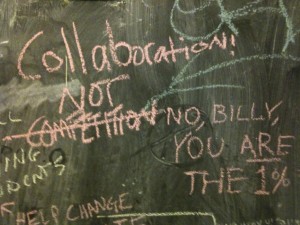Public Culture’s “Intellectual Practice” Pitch
Dear John,
Thanks for identifying Klinenberg’s letter as an occasion to refine our position on disciplinary collaboration, specialization, and the problem of “addressing a public.” That phrase sticks out to me in the quote you pulled–no doubt because of its resonance with Klinenberg’s statement. It strikes me that we more often talk about managing populations than addressing a public. I take our position overall to be that intellectuals do not affect populations primarily by persuading them to think this way or that, but rather by institutionalizing ways of knowing. This involves establishing the terms according to which statements about the public good can be appraised and ratified as much as it does wagering statements in the space of evaluation so established.
I wonder if this can be Klinenberg’s model? It’s difficult to know. The letter does, as you note, invoke the figure of the public intellectual who through plain and persuasive writing might influence a broad audience on matters of shared concern. It also invokes a community of crafty scholars who can be expected to take interest in each others’ work process apart from its results. Are we to think of the public intellectual type as one posture or role the team of crafty scholars might assume? (Perhaps they could designate a star spokesperson or create a virtual avatar.) Or is the public intellectual an ideal type to which every crafty scholar should aspire? I think we could become comfortable affirming the first proposition, but never the second.
As you note, a lot depends on the craftiness at issue, and the picture of the lone scholar laboring in the workshop has got to go.
There are at least two other points in Klinenberg’s letter worth bringing up.
First, this is all really important business: if we are to survive the coming environmental cataclysm and neoliberalism’s savage depredations, we need to get with the program! Is Public Culture’s idea that intellectuals can intervene on these matters by making more accessible arguments in its pages or by better understanding how they do what they do? I hope not. To intervene on these questions requires not simply identifying and defending alternatives but actually institutionalizing them, which means learning to work with engineers and policy wonks.
Second, Klinenberg writes:
in the future, as in the past, we will publish analytic images — that is, pictures that help us glimpse the cultural patterns, social structures, and transformations of nature underlying contemporary life. They will include photographs by artists, journalists, and scholars but also images of artworks, film stills, and video footage on our website. These images will surprise not only by revealing times and places rarely seen but also by modeling ways of using our eyes to register deep changes in the social and natural landscape. They will, in short, be pictures to think with.
Good idea! And an occasion to underscore our statement that “while social scientists certainly worry about whether they are talking to themselves, they may be better positioned to make their work relatable because they never equated discipline with the effort to specify a media object.” Public Culture has been fairly unusual in allowing images to share conceptual space with arguments (as opposed to being objects that prose necessarily interprets). This is not to say that pictures and words analyze in the same way or that it is not worth figuring out how they differ.
